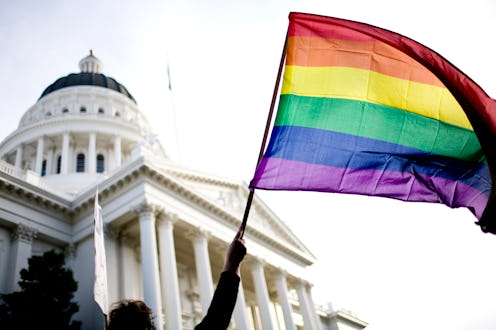News
The Last Thing You Should Be Saying About Orlando
At least 50 people were killed and more than 50 others wounded when a gunman opened fire at a gay nightclub in Orlando, Florida, early Sunday in what is being called the worst mass shooting in U.S. history. As has become commonplace in the aftermath of mass shootings, arguments on everything from gun control to access to mental health services to the shooter's religious affiliation have flared up. In the wake of the Orlando nightclub shooting many have questioned the link between the location of the shooting and the shooter's motive, while others argue against politicizing tragedy. But can you politicize something that's already political?
Tragedies like the shooting at Pulse nightclub in Orlando are inherently political. They became political the moment the shooter picked up his gun. Although authorities in Orlando are still investigating what motivated the shooting, it seems worth noting the gunman chose a popular gay nightclub during LGBT Pride Month. Because the shooter likely cared about the sexual orientation of his victims, so must we. To ignore that the 50 people shot dead in Pulse were potentially targeted and killed because they were in a gay nightclub means ignoring some of the vital issues at play here.
I can't think of a single person who'd want to be accused of using acts of senseless violence or the deaths of innocent people to push their political agenda, but tragedy and crises naturally beget conversations on how to improve the system to prevent future incidents. We mustn't stick our heads in the sand no matter how uncomfortable the conversation becomes. By seeking an apolitical response we lose opportunities to drive change, to let progress rise like a phoenix from the ashes of tragedy.
Members of the LGBT community are entitled to safe spaces, they are entitled to legal protection. Until it is no longer a risk for gay men and women to come out, for a transgender person to walk into a bathroom, for a same-sex couple to hold hands or kiss in public, their identity will always matter when they are senselessly attacked and killed.
Even insisting people refrain from discussing the event in a political manner is, in its own way, a means of politicizing the event. Call it the politics of apolitical grief, I guess. But it's important to allow for discourse, for scrutiny, for a complete evaluation of what's working and what still needs work in the wake of mass shootings. To argue against such rhetoric feels, to me, wholly insensitive. It seems akin to arguing the details behind why a mass shooting or a hate crime occurs — or more importantly how they can be prevented — are inconsequential and everything is fine just as it is when clearly it isn't.
President Obama had some poignant words about the importance of leaving politics in conversations about mass shootings last year after nine people were shot and killed at Umpqua Community College in Oregon by a shooter who later turned the gun on himself. "This is something we should politicize. It is relevant to our common life together, to the body politic," Obama said. "This is a political choice that we make to allow this to happen every few months in America. We collectively are answerable to those families who lose their loved ones because of our inaction."
Let us not remain inactive now. Let us not refrain from talking about how we can better protect valuable and vulnerable members of our larger community. Let us turn our sorrow into positive change.
